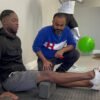
Living with pain stemming from the nervous system can be an overwhelming and challenging experience. Nerve-related pain, also known as neuropathic pain, can manifest in various forms, such as tingling, burning, stabbing, or electric shocks.
This blog aims to shed light on identifying and treating pain, specifically through KWIC Physiotherapy originating from the nervous system, providing valuable insights for those navigating this complex journey.
I. Understanding Nerve-Related Pain:
1. Causes of Neuropathic Pain:
Nerve-related pain can result from various conditions, including diabetes, autoimmune diseases, infections, and injuries. Understanding the root cause is crucial for effective management.
2. Types of Neuropathic Pain:
Different types of nerve-related pain exist, such as peripheral neuropathy, trigeminal neuralgia, and sciatic nerve pain. Recognizing the specific type is vital for tailoring an appropriate treatment plan.
II. Identifying Symptoms:
1. Sensory Changes:
Nerve-related pain often presents with altered sensations like tingling, numbness, or hypersensitivity. Recognizing these sensory changes is the first step in diagnosis.
2. Pain Characteristics:
Describing the pain accurately, such as whether it’s burning, stabbing, or shooting, helps healthcare professionals identify the type of nerve involvement and guide treatment decisions.
III. Diagnosis:
1. Medical Evaluation:
Seeking professional medical advice is crucial for an accurate diagnosis. Neurologists, pain specialists, or primary care physicians may conduct various tests, including nerve conduction studies and imaging, to identify the underlying cause.
2. Patient History:
Providing a detailed medical history, including any underlying conditions, medications, and lifestyle factors, assists healthcare providers in understanding the context of the nerve-related pain.
IV. Treatment Options
1. Medications:
Various medications, such as anticonvulsants, antidepressants, and analgesics, are commonly prescribed to manage nerve-related pain. These aim to alleviate symptoms and improve overall quality of life.
2. Physical Therapy:
Physical therapy sessions are crucial components of nerve pain management through physiotherapy.
employ hands-on techniques to alleviate pain, improve range of motion, and enhance physical function.
The goal of physical therapy is to promote overall well-being and functional independence
3. Nerve Blocks
In certain cases, nerve blocks or injections may be recommended to deliver medications directly to the affected nerves, providing localized relief.
Alternative Therapies:
Complementary approaches like acupuncture, chiropractic care, and mindfulness techniques have shown promise in managing nerve-related pain and enhancing overall well-being.
V. Lifestyle Modifications:
1. Healthy Living:
Adopting a healthy lifestyle, including regular exercise, a balanced diet, and adequate sleep, can contribute to overall nerve health and reduce the impact of neuropathic pain.
2. Stress Management:
Stress can exacerbate nerve-related pain. Practices such as meditation, deep breathing exercises, and mindfulness can be beneficial in managing stress and improving pain outcomes.
Conclusion
Living with nerve-related pain requires a multidimensional approach that involves understanding the underlying causes, accurate diagnosis, and personalized treatment plans. By combining medical interventions, lifestyle modifications, and supportive therapies, individuals can regain control over their lives and work towards minimizing the impact of neuropathic pain. Seeking professional guidance and staying informed are essential steps on the path to managing and overcoming nerve-related pain. If you are facing above mention any problem contact best physiotherapy in Kitchener.



